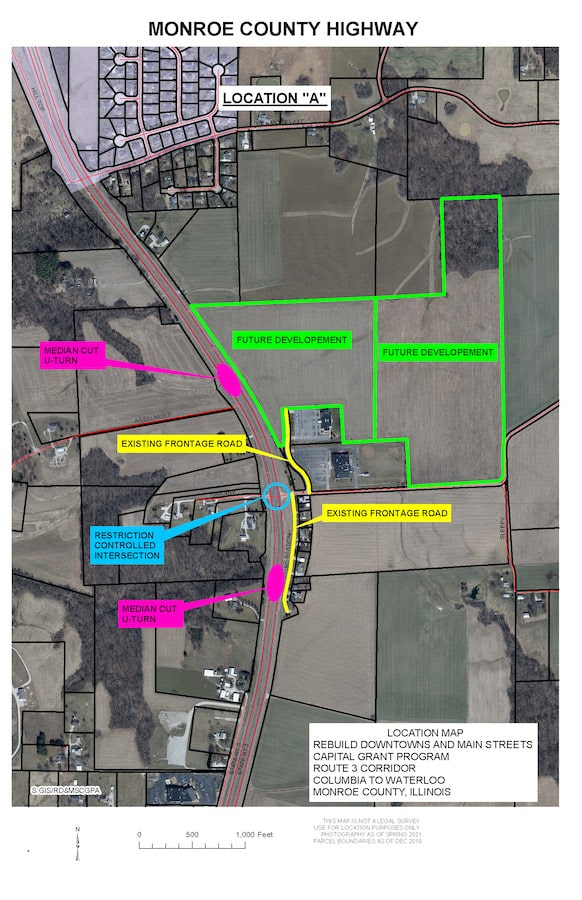Columbia scrambling on OSHA mandate
The City of Columbia is in a race against the clock to conform to Occupational Safety and Health Administration guidelines concerning employees and COVID-19 by Jan. 10.
On Nov. 5, OSHA issued an “emergency temporary standard’’ requiring all employers with more than 100 employees to either implement a mandatory vaccine requirement or ‘‘adopt a policy requiring employees to either get vaccinated or elect to undergo regular COVID testing and wear a face covering at work in lieu of vaccination.’’
The ETS had been stayed by the Fifth U.S. District Court of Appeals until the stay was lifted Dec. 18 by the Sixth U.S. District Court of Appeals.
At Monday’s city council meeting, Columbia City Administrator Doug Brimm advised the council of the Illinois Municipal League’s recommendation to “prepare to implement ETS policies and procedures by or on Jan. 10” due to the “fluctuating status.”
Brimm further explained the city falls under the jurisdiction of Illinois OSHA, not the federal organization. However, Illinois OSHA issued a statement Dec. 27 signifying it “intends to adopt the (federal) standard for state and local government employers,” hence the short turnaround for developing the policy.
Brimm pointed out the decision constitutes another “unfunded mandate,” but also stressed to the council “this is nothing we have latitude on” and that he was seeking the council’s direction on how to proceed with policy for city employees.
Columbia Mayor Bob Hill said he did not want to make anyone get the vaccine who didn’t want to.
This was also the consensus view of the aldermen.
With mandatory testing for unvaccinated employees the decided route, aldermen discussed the logistics of how to best comply with weekly COVID testing requirements.
Columbia EMS Chief Kim Lamprecht advised the council that all full-time city EMS staff have proper training for administering tests and a system for unvaccinated individuals to get tested outside EMS headquarters was feasible.
Columbia EMS currently provides tests for employees who have had close contact with COVID-positive individuals under a test-to-work scenario.
Brimm believed having EMS administer tests would be the best option, as lines for public drive-thru testing sites have long lines as well as extended wait times for results.
Aldermen then discussed responsibility for the cost of the tests.
Ward III Alderman Paul Khoury did not want the cost of a COVID test, around $6.25 for one EMS-provided test, to come out of the EMS budget, suggesting a charge to an employee for the test “would be a prudent way to approach it.”
Ward III Alderman Jeff Huch took a different approach, saying he views the tests as a “cost of doing business” and the city should “eat the cost (of the COVID test), not the employee.
It was decided to have EMS provide mandatory tests for unvaccinated employees – the cost of which will be reimbursed from the city’s general fund.
Several aldermen expressed displeasure that unvaccinated employees were being mandated to weekly testing in the first place.
“Help me understand the logic (of the mandate), because it’s confusing the heck out of me,” Ward II Alderman Mark Roessler said.
He wondered why only unvaccinated employees would be forced to test in light of recent increases in breakthrough COVID infections of vaccinated individuals.
Ward I Alderman Doug Garmer agreed with Roessler, adding that no other tests are required as a condition of employment apart from drug screenings.
“We’ve got to be prepared,” Garmer conceded, but also called the mandate a “slippery slope.”
“What’s next?” Garmer asked, “giving smokers tests to see if they have cancer?”
Roessler also asked what the ratio is currently of COVID cases as related to vaccination status and questioned how long the ETS would be in place.
Lamprecht responded that EMS documents the data and she assumed a federal study would eventually show the results, although she also questioned whether the statistics in those studies would be reliable.
For Roessler’s second question, Brimm said the OSHA requirement was only applicable for six months, although it could be subject to extension depending on future COVID data.
Further concerns were aired about inconsistency with CDC quarantining guidelines as well as lack of clarity and consistency among federal agencies concerning how employment status is determined.
Brimm noted that city aldermen, for IRS purposes, are employees, but for many other federal groups, they are not classified as such. He added that OSHA requirements tend to count as many eligible people as possible as employees.
The next step to comply with the OSHA mandate requires the city to gather proof of vaccination and “provisions other than testing for employees who have not completed the entire primary vaccination” by Jan. 10.
For those who will not take the vaccine or be fully vaccinated, testing protocols will need to be in place by Feb. 9.
For employers of 100 or more, lack of policy implementation by Feb. 9 could result in fines of $14,000 per day per individual for “wanton and willful” disregard for the mandate.
Brimm pointed out the mayor and other city administration could also be fined personally if the city disregarded policy implementation.
The Centers for Medicare & Medicaid Services had previously implemented a mandatory vaccine requirement for health care workers that is stayed in 25 states which have challenged the policy.
Illinois did not challenge the mandate.
“Unfortunately, we live in the State of Illinois, so we won’t get any help from the lawsuits” filed by other states, Hill said, referring to possible relief from federal regulations as a result of a ruling in the CMS case.
Brimm advised the council to expect the policy to take effect this coming Monday unless “something miraculous” happens when the U.S. Supreme Court begins hearing oral arguments Jan. 7 on the ETS appeal.
Monroe County and the City of Waterloo are currently in the process of developing their own policies on this OSHA standard.
Also this week, the City of Belleville took action on the OSHA ETS. The Belleville City Council voted 14-1 to require employees to get a COVID vaccine unless they have a qualified medical or religious exemption, according to the Belleville News Democrat.
In other business, the council approved a resolution to send a letter of support for a Monroe County Highway Department grant application to receive funds for “R-cut” intersections along Route 3 between Columbia and Waterloo.
Columbia City Engineer Chris Smith said the county included Columbia in the project as a courtesy, with the assumption that some of the property where the R-cuts would be built may be part of Columbia city limits in the future.
The R-cuts, Smith said, “minimizes conflict by half” by not allowing left turns onto Route 3 at four different intersections.
Instead, motorists would turn right onto the highway and complete a legal U-turn about 1,000 feet down the respective side of Route 3.
The proposed R-cuts would be installed at the intersections with Hanover, Coxeyville and EE roads and Granny Lane.
If approved, Monroe County Engineer Aaron Metzger said construction would begin in late 2023 or sometime in 2024, depending on the Illinois Department of Transportation, which owns right-of-way on Route 3.
At the beginning of the meeting, Brimm gave the council a department update for the city administrator’s office.
He said topics that will be discussed in the current quarter include updating city codes, including building codes and the liquor codes.
The process began prior to the latest iteration of city council and Brimm would like Hill and the three newest aldermen to have a chance to give input before changes are made.
He also noted that one aspect of the city’s liquor code controlling video gambling will need to be updated as well.
There is currently a moratorium in place restricting new video gambling licenses from being issued. When the city decides to remove the moratorium, it will also need to determine the new charge for such permits, as a new state law has increased the maximum charge for issuance from $25 to $250.







